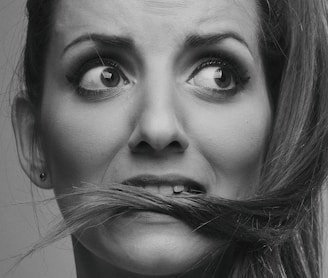DANDRUFF VS DRY SCALP
20 DIFFERENCE BETWEEN DRY SCALP AND DANDRUFF
HEALTH
6/8/20233 min read


DANDRUFF VS DRY SCALP
Dandruff and dry scalp are two common scalp conditions that people often confuse.
DANDRUFF
Dandruff is a common scalp condition in which small flakes of dead skin appear on the scalp and in the hair. It is often accompanied by itching and can have several causes including dry skin, a buildup of oil and dead skin cells, or a sensitivity to hair products. Dandruff can also be a symptom of other skin conditions such as psoriasis or eczema.
Dandruff:
1. Dandruff is a condition that causes itchy, flaky, and scaly skin on the scalp.
2. It is generally caused by a yeast overgrowth on the scalp called Malassezia.
3. Symptoms of dandruff may include the appearance of white or yellow scales on the scalp, itching, redness, and inflammation.
4. Dandruff can be easily treated with over-the-counter medicated shampoos that contain ingredients like selenium sulfide, salicylic acid or coal tar.
DRY SCALP
Dry scalp is a condition in which the scalp lacks sufficient moisture or natural oils. It can result in itching, flakiness, and irritation, similar to dandruff. Dry scalp can be caused by several factors, including dehydration, cold weather, harsh hair products, and certain medical conditions. As opposed to dandruff, which is caused by excess oil, dry scalp is caused by insufficient oil or moisturization. Treatment for dry scalp can include using a moisturizing shampoo and conditioner, avoiding harsh hair products, increasing water intake, and using a humidifier in dry environments.
Dry Scalp:
1. Dry scalp occurs when the scalp is not producing enough natural oil or sebum to keep it moisturized.
2. It can be caused by environmental factors such as cold weather, harsh shampoos, or excessive shampooing.
3. Symptoms of dry scalp include itching, flaking, and sometimes even bleeding and reddening scalp.
4. It can be managed by using gentle, moisturizing shampoos and conditioners with ingredients like jojoba oil, coconut oil or aloe vera.
20 DIFFERENCES : DANDRUFF VS DRY SCALP
1. Dry scalp is characterized by dryness and itching, while dandruff is characterized by white or yellow flakes of skin that may be accompanied by itching.
2. Dry scalp can affect the whole scalp or just a particular area, while dandruff typically affects the entire scalp.
3. Dry scalp is caused by a lack of natural oil on the scalp, while dandruff is caused by an overproduction of oil and yeast on the scalp.
4. Dry scalp can be caused by environmental factors such as cold weather and harsh shampoos, while dandruff is caused by the fungi Malassezia on the scalp.
5. Dry scalp can be treated with moisturizing shampoos and oils, while dandruff can be treated with antifungal shampoos and medicated treatments.
6. Dry scalp can cause the scalp to become flaky and itchy, while dandruff can cause the scalp to become oily and smelly.
7. Dry scalp may lead to hair loss, while dandruff generally does not.
8. The flakes associated with dry scalp tend to be smaller and more powdery in texture, while the flakes associated with dandruff tend to be larger and oily in texture.
9. Dry scalp flakes are usually more scattered and less prominent on the scalp, while dandruff flakes tend to clump together and cover the scalp more evenly.
10. Dry scalp can be treated simply by adjusting washing habits and using gentler hair products, while dandruff may require a prescription shampoo or other treatments.
11. Dandruff is more common in adults, while dry scalp can affect people of all ages.
12. Dry scalp is more common in people with curly or thick hair, while dandruff is more common in people with oily and straight hair.
13. Scratching dry scalp can lead to further damage and irritation, while scratching dandruff can cause the flakes to spread throughout the hair.
14. Dry scalp is often associated with other skin conditions such as eczema and psoriasis, while dandruff is not.
15. The flakes of dry scalp appear to be whiter, while the flakes of dandruff appear to be yellowish-white.
16. The flakes of dry scalp are usually dry and fluffy, while the flakes of dandruff can be sticky.
17. The onset of dandruff can be sudden and severe, while the onset of dry scalp can be gradual and less noticeable.
18. Dandruff can cause redness and inflammation on the scalp, while dry scalp does not.
19. Dry scalp can be accompanied by hair breakage and tangling, while dandruff does not usually cause such issues.
20. Dandruff can sometimes cause pimples on the scalp, while dry scalp does not.
CONCLUSION
While dandruff and dry scalp may seem similar due to the appearance of flakes, they are different conditions with distinct underlying causes. Dandruff is caused by an overgrowth of yeast on the scalp, while a dry scalp is caused by a lack of moisture in the skin. Symptoms of these conditions can be similar, but proper diagnosis and treatment are essential for effective relief. Maintaining a healthy scalp through regular washing and conditioning, using appropriate hair products, and managing underlying health conditions can help prevent both dandruff and dry scalp.
